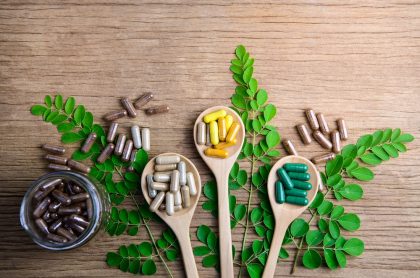Is acid reflux really a problem of too much acid? Part one


In this two-part series, we’ll take a look at some of the main causes and treatments for acid reflux, starting with some in-depth background information.
Most people who experience acid reflux assume, or have been told by their healthcare provider, that they have an excess of hydrochloric acid (HCL), the acid produced naturally by the parietal cells of the stomach. However, acid reflux is rarely attributable to excess stomach acid. Rather, it is often a symptom of low stomach acid. Among other things which will be discussed shortly, low HCL can lead to digestive enzyme deficiency, malabsorption, a weakened lower esophageal sphincter, parasitic infection, and nutrient deficiencies, further exacerbating the problem.
Proper Digestion: Brief Overview
After mechanical mastication (fancy term for “chewing”) in the mouth and swallowing occurs, food travels down the esophagus into the stomach for further mechanical and additional chemical digestion. The presence of food initiates the production of HCL by the parietal cells of the stomach. In fact, even the mere thought of food triggers the production of gastric juice, highlighting the brain-gastrointestinal connection.
The stomach is perfectly designed to manufacture and contain this harsh substance, though the esophagus and the duodenal section of the small intestine are not as well equipped. With a pH of 1-3, outside of the stomach, HCL would burn through your shirt or cause blindness if it hit your eyes. However, the stomach lining stays protected by a thick layer of mucus, acting as a buffer against the acidic hydrochloric acid. In addition to HCL, chief cells of the stomach produce pepsinogen, a protein-digesting enzyme that is converted to pepsin, the active form, in the presence of HCL. Together, these two substances chemically digest protein into its absorbable amino acid building blocks.
Once food has been adequately churned into a split-pea soup-looking goop called “chyme,” the pyloric sphincter incrementally opens to allow small amounts to pass into the small intestines, where 90% of nutrient absorption will occur (the remaining 10% is left to the colon). The chyme is still highly acidic, and it is this change in acidity that triggers the small intestine to release the hormones cholecystokinin (CCK) and secretin. Secretin signals the pancreas to release pancreatic juice, which contains digestive enzymes to further break down food particles, and bicarbonate, which neutralizes the acidic chyme so it does not erode the delicate tissue of the small intestine. CCK tells the gallbladder to release bile to emulsify large fat globules and aid in the absorption of the fat-soluble vitamins, A, D, E, and K. From here, most nutrients are absorbed while unneeded material continues on to the colon where it will eventually be eliminated.
When Things Go Wrong
In a perfect world, all of us would be digesting in this manner. Nevertheless, 40% of Americans experience acid reflux at least once per month. When there is a lack of HCL, a number of problems arise. First, protein digestion can be dramatically impaired. As mentioned above, the HCL/pepsin team breaks down protein into its individual amino acid constituents which can be absorbed. Protein deficiency can produce effects such as neurotransmitter imbalance in the brain, endocrine dysfunction, edema, muscle wasting, thinning hair and nails, fatigue, frequent infections, and wounds healing slowly.
Second, HCL is necessary for the absorption of a number of vitamins and minerals, namely B12, B6, folate, calcium, zinc, and iron. A deficiency of any of these nutrients can cause a wide variety of health effects, including muscle spasms, nerve damage, increased risk of cardiovascular disease due to increased levels of homocysteine, neural tube defects in newborns, immune dysfunction, and osteoporosis.
Third, hydrochloric acid is the first line of defense against food-borne pathogens. Inadequate levels of HCL are associated with imbalances in normal gut flora, the healthy bacteria that reside in the small and large intestines. These bacteria assist in further food breakdown and synthesize a number of nutrients, including certain B vitamins and vitamin K. In the small intestines and colon, incorrect pH creates an inhospitable environment for the friendly bacteria, allowing pathogenic bacteria, yeasts and fungi to proliferate. This leads to a decline in synthesis of the above-mentioned nutrients, further contributing to deficiencies.
The walls of the small intestines are normally tightly bound to prevent large food particles from entering circulation. However, pathogenic organisms can loosen these junctures, creating holes that allow undigested proteins to enter systemic circulation, sending the immune system out of control as it constantly battles assumed invaders.
One pathogenic bacteria of particular concern is Helicobacter pylori, or H. pylori. This bacterium has an innate mechanism for surviving the acidic environment in the stomach. It is normally confined to certain areas of the stomach, but under low HCL conditions, it can actually further aggravate the problem by infecting the parietal cells that produce HCL, causing them to atrophy. H. pylori has been associated with gastric ulcers and cancer, not to mention worsening acid reflux.
Fourth, without proper acidity, the release of secretin and CCK is hindered, leading to digestive enzyme deficiency and inadequate amounts of bile to complete digestion, along with an absence of bicarbonate. The low levels of bile allow fat to go only partially digested and become rancid, contributing to feelings of nausea, headaches, and even vomiting. The gallbladder normally releases bile on a regular basis as the liver constantly produces bile as a way to eliminate fat-soluble toxins. The gallbladder concentrates this bile. Over time, irregular emptying of bile can cause it to become over concentrated, inviting the formation of gallstones. The lack of bicarbonate to neutralize the stomach acid promotes the formation or exacerbation of duodenal ulcers.
As a protective mechanism for keeping all of the above from occurring, the stomach attempts to hold the chyme for as long as possible. If the meal contained carbohydrates, they will begin to ferment in the stomach’s warmth, producing gas. Symptoms associated with this include belching and a sense of premature and prolonged fullness, and bloating after meals. The gas also exerts pressure on the esophageal sphincter, which connects the esophagus to the stomach and normally only opens to allow food to pass, causing it to inappropriately open and acid to reflux.
As you can see, the needs for HCL are multifaceted. It is very rare for the stomach to over-produce HCL, and suppressing already low levels of it is simply adding insult to injury. Acid-suppressing drugs have their place, but should never be depended on for the reasons just explored.
In the second part of the series we’ll look at different types of treatments for acid reflux, as well as various types of antacids.
Similar articles
-
Is there a connection between cancer, diet and CBD?
inAs more and more Americans get sick with cancer, Holistic Cannabis Practitioner Erin Kenney looks at the connection between cancer, diet and CBD.
-
Adaptability is the real way to reduce stress
inI just can’t stand hearing the word ‘stress’ anymore – nearly every health problem is connected to stress and doctors and patients alike both talk about it. In this article, we’re going to discuss how to reduce stress
-
Have Irritable Bowel Syndrome (IBS)? Kimsey to the rescue!
inIn the first part of a two-article series, Master Nutrition Therapist Kimsey Self describes how you can know if you have IBS or if you’re likely to suffer from it.
More in Health
-
Do you really need supplements for a healthy lifestyle?
inMany people regularly ask, “do I really need supplements for a healthy lifestyle?”, and if so, which are the best ones to take?
-
Biohack: how to reap the top health benefits of grounding!
inI’m sure you’ve all heard of grounding, it’s been quite the buzz word recently. But what is it, really, and what are the health benefits of grounding?
-
Discover the power of conscious deep breathing on your health
inBreathing is something the body does without any conscious effort, but the power of conscious deep breathing is definitely no joke!















